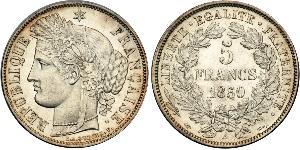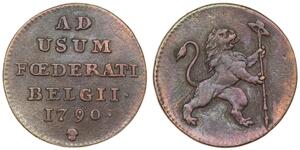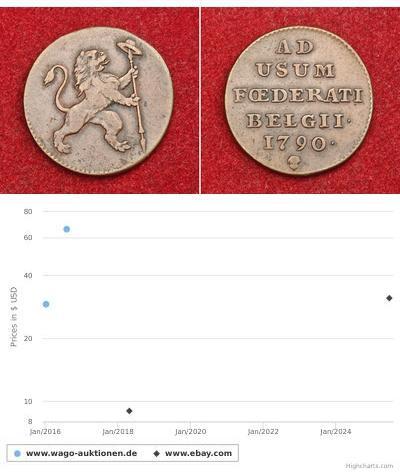1 Franc Italian city-states Silver Charles Felix of Sardinia
1807, Lucca (Republic), Felix & Elisa Bonaparte. Silver 1 Franco Coin.
Mint Year: 1807
References: KM-23.
Denomination: 1 Franco (1 Franc)
Material: Silver (.900)
Diameter: 23mm
Weight: 5gm
Obverse: Draped and diademed bust of Elisa Bonaparte and bare head of Felix Bacciochi side by side right.
Legend: FELICE ED ELISA PP. DI LUCCA E PIOMBINO.
Reverse: Value (1 FRANCO) within laurel wreath. Date (1807) below.
Legend: PRINCIPATO DI LUCCA E PIOMBINO
Lucca is a city in Tuscany, northern central Italy, situated on the river Serchio in a fertile plain near (but not on) the Ligurian Sea. It is the capital city of the Province of Lucca. Lucca was the second largest Italian city state (after Venice) with a republican constitution (“comune”) to remain independent over the centuries.
In 1805, Lucca was taken over by Napoleon, who put his sister Elisa Bonaparte Baciocchi in charge as “Queen of Etruria”. This affair is commemorated in the famous first sentence of Tolstoy’s War and Peace:
“Well, Prince, so Genoa and Lucca are now just family estates of the Bonapartes.(...) And what do you think of this latest comedy, the coronation at Milan, the comedy of the people of Genoa and Lucca laying their petitions [to be annexed to France] before Monsieur Bonaparte, and Monsieur Bonaparte sitting on a throne and granting the petitions of the nations?” (spoken by a thoroughly anti-Bonapartist Russian aristocrat, soon after the news reached St. Petersburg).
After 1815 it became a Bourbon-Parma duchy, then part of Tuscany in 1847 and finally part of the Italian State.
Maria Anna (Marie Anne) Elisa Bonaparte Baciocchi, Princesse Francaise, Duchess of Lucca and Princess of Piombino, Grand Duchess of Tuscany, Comtesse de Compignano (January 13 1777 – August 7 1820) was the fourth surviving child and eldest surviving daughter of Carlo Buonaparte and Letizia Ramolino.
Elisa was born in Ajaccio, Corsica. She was a younger sister of Joseph Bonaparte, Napoleon I of France and Lucien Bonaparte. She was an older sister of Louis Bonaparte, Pauline Bonaparte, Caroline Bonaparte and Jerome Bonaparte. Her sharp tongue often caused troubles in her relations with her brother Napoleon.
She was established as a member of the Imperial family of the First French Empire on May 18, 1804. She received the title of Imperial Highness. On March 19, 1805, Napoleon awarded her with the Principality of Lucca and Piombino.
Her separation from her husband was seen favorably by Napoleon. On March 3, 1809 he gave Elisa the honorary title of a Grand Duchess of Tuscany, which had been annexed by France in 1807. Her husband soon rejoined her however.
Elisa remained Grand Duchess of Tuscany until February 1, 1814, when Grand Duke Ferdinand III was restored to the throne he had occupied before 1801. Elisa spent the later years of her life in seclusion and died in Trieste. She was buried in the San Petronio Basilica of Bologna. She was also the only adult sibling of Napoleon Bonaparte who did not survive him.
Felice Pasquale Bacciocchi (May 8, 1762 - April 27, 1841, Rome) was an officer in the French army from a noble, but poor, Corsican family who married Elisa Maria Bonaparte in 1797.
After his brother-in-law’s conquests, Bacciocchi became Prince of Lucca, but without the associated powers or the sovereign power, which really exercised by his wife. They separated in 1805 and he moved to Rome, living a simple life there until his death.
(1365 X 658 pixels, file size: ~188K)
Posted by: anonymous 2019-03-28
180?, Lucca (Republic), Felix & Elisa Bonaparte. Silver 1 Franco Coin. F+/G-VG! References: KM-23. Denomination: 1 Franco (1 Franc) Mint Period: 1805-1808 (date not recognizable!) Condition: Dark oxxidtion in obverse field, pierced, with a rusted fragment stuck inside piercing, ...
(3205 X 1567 pixels, file size: ~944K)
Posted by: anonymous 2023-10-31
Untitled Document 1807, Lucca (Republic), Felix & Elisa Bonaparte. Silver 1 Franco Coin. NGC AU-55! Mint Year: 1807 References: KM-23. Denomination: 1 Franco (1 Franc) Condition: Certified and graded by NGC as AU-55! Material: Silver (.900) Diameter: 23mm Weight: ...
(900 X 460 pixels, file size: ~118K)
Posted by: anonymous 2015-11-23
Italien-LuccaFranco 1807. K.M. 23, Pagani 257. Schöne Patina. Sehr schön / vorzüglich
(900 X 448 pixels, file size: ~118K)
Posted by: anonymous 2015-11-19
Italien-Lucca Franco 1807. K.M. 23, Pagani 257. Sehr schön - vorzüglich
1 Liard Belgium Copper
group has 4 coins / 4 prices
⇑




















